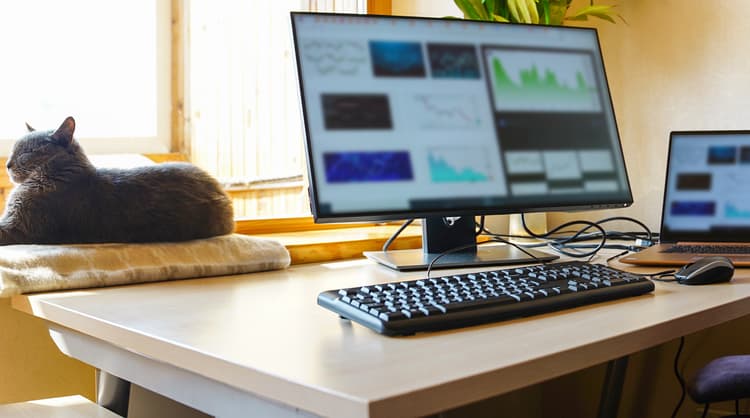How to re-engage with your job while working remotely

Recent research has demonstrated that working from home (WFH) is rising in popularity with both the Australian workforce and their employers. However, nobody predicted the sudden requirement for so many Australians to work from home that Covid-19 has forced upon us. For many people, working remotely has become a way of life that reduces commuting time and costs, as well as fitting in well with home and family commitments.
However, WFH isn’t without its difficulties and you may well already be feeling the effects of loneliness, the lack of opportunities for collaboration and even just the office chatter. If working remotely is a new experience for you or if you feel the need to revamp your home working life, SkillsTalk have a few tips on how to re-engage with your job from the comfort of your home office.
Find ways to keep your home and work life separate

- Establish a working day routine but be aware this might be different from your usual one. For example, you might need to share childcare time with your partner or be flexible about your working hours.
- Set aside a separate space for work. If you can’t do this then make sure you put away your work equipment at the end of your home working day.
- If you can, take the time to travel ‘to work’ and ‘home from work’. This might be a short walk around the block, a longer cycle ride or even a session on the treadmill. It will give your brain and body a bit of downtime before it adjusts to the next phase of your day.
- Talk to your family at home about how you would like to work and try to agree on arrangements that suit everybody. Be prepared that these might not always work out exactly as you want them to.
- Take days off work in the same way you would if you were going into the office. If you don’t usually work on weekends, don’t start doing so because you are at home.
- Be careful about your digital activity outside your working hours. Switch off notifications for work communications, try to make sure you get some non-screen time and exercise when it is possible.
- At the end of each week, try to examine how things have gone. Talk to the people you share your home with and collaborate to make this tricky situation work for everyone.
Make sure you are still communicating with colleagues
If you are used to working physically alongside your colleagues, the sudden lack of communication that comes from working from home can be a shock. Not only do we rely on our colleagues for advice, encouragement and collaboration, many people who work from home also really miss office chatter and the creativity that comes from bouncing ideas around.
The good news is that, with today’s digital communication tools, there is plenty of opportunity out there to set up excellent communication and organisation systems that will work whether you are working from home or from the office. A few suggestions include:
- Google Drive for file sharing and collaboration
- Slack for productive teamwork
- WeTransfer for really simple file sharing
- Zoom video conferencing
- Basecamp for digital project management
If you haven’t done it before, learning how to use digital tools takes time and can sometimes be stressful. Be kind to yourself, don’t expect to be able to do everything straight away and don’t be afraid to ask for help if you need it. Of course, even with all of these digital tools and the expertise to use them, you are probably still missing chatting with your colleagues. If you are, why not pick up the phone and do just that - chances are, they are missing you too.
Continue to consider your career

Although clouds don’t always have silver linings, it is often in the midst of adversity that we can find opportunity. Working from home may well give you the chance to think about your current role in different ways. It might even give you space to consider a new career direction. Here are a few questions you might like to ask yourself.
Would I like my future to include more flexible working?
As the weeks of WFH continue, you will have more opportunity to analyse your work patterns and experiences then decide whether or not flexible working is right for you. Aspects of your new work lifestyle you should consider include impact on your family, your stress levels, your work output, your earnings and your expenditure. These might change from week to week so it could help to keep a short diary.
It is important to remember that working from home under current coronavirus related restrictions won’t necessarily reflect completely your experiences during more usual times. Having young children at home or relying on online meetings for all communications are just two examples of this. However this enforced WFH time has given many Australians the opportunity to experience a way of life they may have been thinking about for some time.
Which training opportunities would fit in with my new WFH routine?
Although physically attending college or university is out of the question at the moment, there may never be a better time to try your hand at online learning. Studying online allows you to create your own flexible schedule at the same time as providing plenty of remote support and collaboration opportunities.
Whether you are looking for a new career or want to enhance your career prospects in your existing one, online courses are a great way of demonstrating your interest in moving ahead and enhancing your prospects of promotion.
Whether you want to learn to code, become a business leader or even just improve your social media persona, look for nationally recognised courses and choose from a wide range of subjects and qualification levels.
Whilst most of us are looking forward to life returning to some kind of normality, we are probably finding some aspects of working from home life that we enjoy. Whether it is more quality time with the family, less travel stress, or even the opportunity to look at our work in a new way, staying positive is often the key to managing tricky situations.
With the tips above and a bit of Australian ingenuity, it should be possible to turn enforced WFH time into a positive experience. If all else fails, we recommend turning to humour and remembering to laugh at yourself from time to time. After all, with your work colleagues not there to tease you, someone has to keep you on your toes.


)
)

